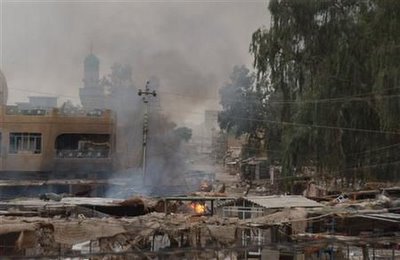It's just another memo.

And so to the issue that has been somewhat swept under the rug due to the sinking of the ship carrying 1400 passengers and the protests over the Danish cartoons. Phillipe Sands has managed to obtain another confidential memo which details the minutes of a two-hour meeting between Bush and Blair. It finally dispels any lingering claim that ministers could make the Blair was not set on war before they tried to gain a second UN resolution. It also again raises questions over whether the Attorney General was told to change his legal advice about the war.
Tony Blair told President George Bush that he was "solidly" behind US plans to invade Iraq before he sought advice about the invasion's legality and despite the absence of a second UN resolution, according to a new account of the build-up to the war published today.
A memo of a two-hour meeting between the two leaders at the White House on January 31 2003 - nearly two months before the invasion - reveals that Mr Bush made it clear the US intended to invade whether or not there was a second UN resolution and even if UN inspectors found no evidence of a banned Iraqi weapons programme.
"The diplomatic strategy had to be arranged around the military planning", the president told Mr Blair. The prime minister is said to have raised no objection. He is quoted as saying he was "solidly with the president and ready to do whatever it took to disarm Saddam".
The memo seen by Prof Sands reveals:
· Mr Bush told Mr Blair that the US was so worried about the failure to find hard evidence against Saddam that it thought of "flying U2 reconnaissance aircraft planes with fighter cover over Iraq, painted in UN colours". Mr Bush added: "If Saddam fired on them, he would be in breach [of UN resolutions]".
· Mr Bush even expressed the hope that a defector would be extracted from Iraq and give a "public presentation about Saddam's WMD". He is also said to have referred Mr Blair to a "small possibility" that Saddam would be "assassinated".
· Mr Blair told the US president that a second UN resolution would be an "insurance policy", providing "international cover, including with the Arabs" if anything went wrong with the military campaign, or if Saddam increased the stakes by burning oil wells, killing children, or fomenting internal divisions within Iraq.
· Mr Bush told the prime minister that he "thought it unlikely that there would be internecine warfare between the different religious and ethnic groups". Mr Blair did not demur, according to the book.
It's somewhat ironic that a time when the US and UK were accusing Iraq of numerous deceptions that they themselves were so desperate for a smoking gun that Bush apparently suggested trying to draw Iraq into attacking a US plane disguised as a UN one. That itself would have been a breach of international law. Is there no end to Bush's apparent urge to do devious things? It makes his apparent urge to bomb Al-Jazeera look good by comparison.
Blair had long made his mind up to support the US whatever happened, and the twisting of intelligence, the half-hearted attempts to get a second resolution and his apparent sitting on Lord Goldsmith to change his advice that war would be illegal without one all show his mendacity on this issue. He constantly said that Saddam could remain in control if he disarmed, when he already knew that there was no way that the Ba'athist regime would be allowed to stay in power. The book by Sands also shows that nearly everyone apart from Blair and Alastair Campbell were unsure about the war - Jack Straw had concerns, as did Jeremy Greenstock. 3 ministers eventually resigned, and Elizabeth Wilmshurst, a deputy legal advisor at the Foreign Office maintains that the Attorney General had the same view as her - that the war was illegal.
But does any of this really matter now? Even if it didn't, Iraq is now in a huge mess. Some journalists are even saying that the situation is getting even worse, if that's possible. As Blair continues to search for his legacy and more and more revelations come out about the war, the more he is implicated in being devious, if not lying (which is hard to conclusively prove), the worse the picture of him becomes. The sad reality for a man who was once seen as the brightest and most inclusive of his generation is that he has no one to blame but himself.
Post a Comment